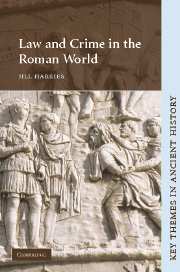Book contents
- Frontmatter
- Contents
- Preface
- 1 Competing discourses
- 2 Public process and the legal tradition
- 3 Cognitio
- 4 The thief in the night
- 5 Controlling elites I: ambitus and repetundae
- 6 Controlling elites II: maiestas
- 7 Sex and the City
- 8 Remedies for violence
- 9 Representations of murder
- Bibliographical essay
- References
- Index
2 - Public process and the legal tradition
Published online by Cambridge University Press: 05 June 2012
- Frontmatter
- Contents
- Preface
- 1 Competing discourses
- 2 Public process and the legal tradition
- 3 Cognitio
- 4 The thief in the night
- 5 Controlling elites I: ambitus and repetundae
- 6 Controlling elites II: maiestas
- 7 Sex and the City
- 8 Remedies for violence
- 9 Representations of murder
- Bibliographical essay
- References
- Index
Summary
At the end of the first century bc the collective rule of the Senate and People of Rome gave way to the sole rule of Augustus and his successors, whose autocracy became increasingly overt. The constitutional practices of the Roman Republic had distributed the power to frame, pass and interpret legislation over a number of different authorities: the priesthoods, charged with interpreting sacred and public law; the magistrates, who could enforce obedience and initiate legislation before the People (Lintott 1999a: 94–102); the Senate, whose collective authority gave more weight to their decrees (consulta) than their formal advisory status might imply (1999a: 65–88); and the popular assemblies themselves, whose enactments were binding on the whole res publica from the third century bc onwards (1999a: 40–64). The application of public criminal law in practice was also affected by the pleading of advocates in court, interpreting both written text and legal convention in the interests of their clients.
The advent of imperial rule brought no immediate formal change; Augustus operated within the letter of the Republican constitutional framework. The reality, however, was that the powers of the main magistracies were vested in one man, the emperor, who could also control other magistrates, Senate deliberations and, through them, what remained of popular legislative authority. Power over law therefore passed to the emperor and his advisers. But emperors could not do everything.
- Type
- Chapter
- Information
- Law and Crime in the Roman World , pp. 12 - 27Publisher: Cambridge University PressPrint publication year: 2007
- 1
- Cited by



